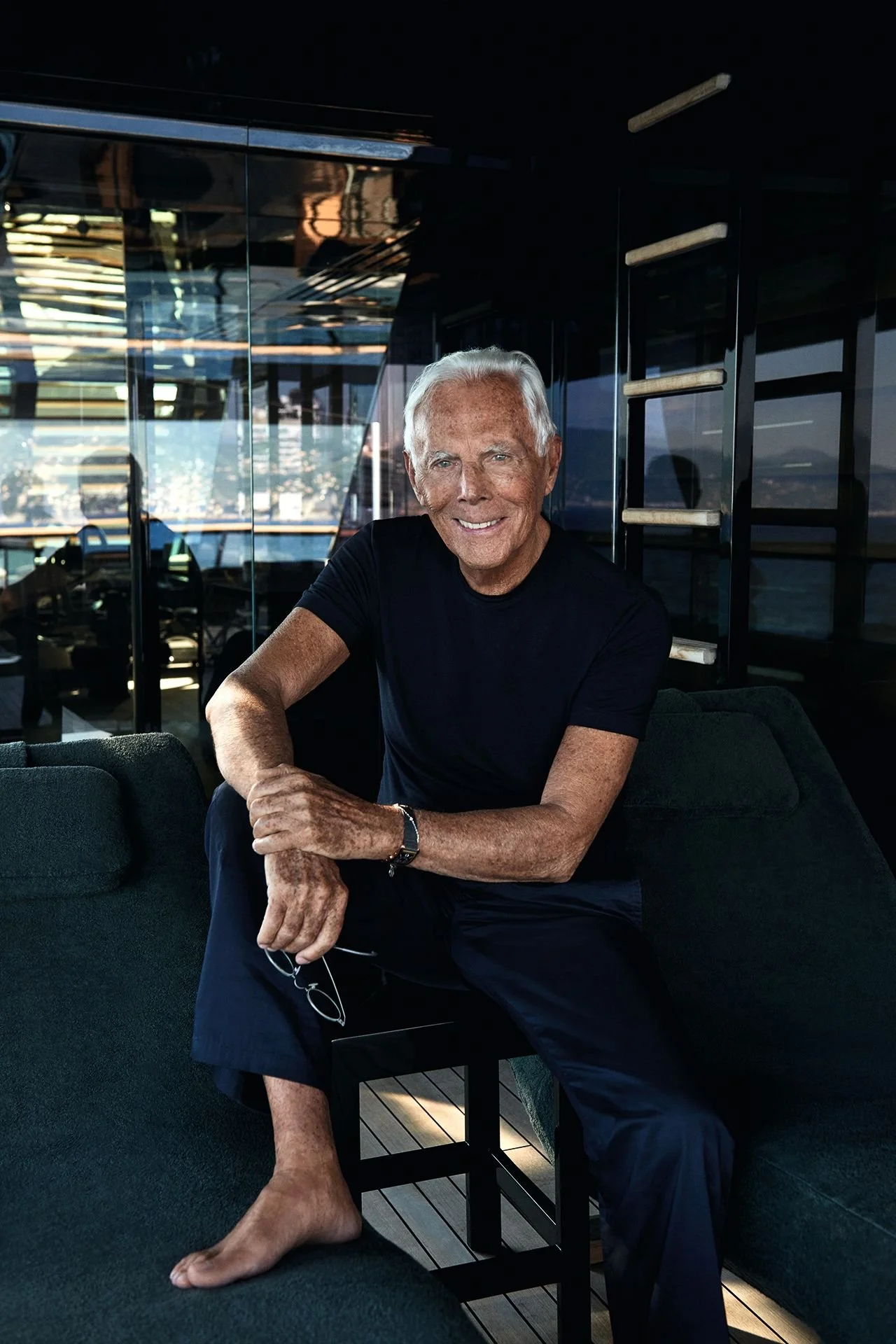The Life and Legacy of Giorgio Armani
Remembering the historic career and impact made by the legendary Italian designer Giorgio Armani in light of his recent passing.
Available via British Vogue © All rights belong to their respective owners. No copyright infringement intended.
The legendary luxury brand Armani devastated fans and industry professionals alike on Thursday, September 4, when they announced the passing of their founder at the age of 91. Italian designer Giorgio Armani was a well-respected pioneer and titan of the fashion industry who was largely recognized as the man who “revolutionized fashion” through the reinvention of the suit. He should be credited as “the father of the modern suit” after changing the suit's traditional rigid structure. By removing the interlining and padding commonly used in tailoring, Armani made the suit's bulky silhouette feel more like a second skin, allowing freer movement. In his autobiography, Per Amore, he wrote, “I believed that a jacket can portray what a person is like much more than exposing the body.”
Armani went on to challenge the way we view fashion and clothes after being named the most successful Italian designer by Vogue in 2001. Never one to follow the ‘rules’ of design, he often eschewed restrictions in style to create timeless looks that empower men and women. Instead of following seasonal trends, the designer believes in an idea of “timeless elegance” , a unique approach to design that encourages a way of buying garments “to make them last”. He hated the idea that style should come at a price and thus created multiple labels to make luxury designs available to the widest possible audience.
Celebrities, politicians, and industry professionals alike have flocked to social media to pay tribute to the late designer, saying they were “honored to have the chance to meet and work with such an amazing person.” Vogue’s Laura Ingham described him as a “true gentleman”, and considering the care he’s taken in his career, it’s no wonder. He showed his true character after the death of one of his models, Ana Carolina Reston, from anorexia nervosa in 2006, when he became the first designer to ban underweight models from his runway. And has continued a notable legacy championing philanthropic causes, including donating more than $2.3 million to Italian hospitals during the Covid-19 pandemic and supporting Save the Children. For his dedication and service, he was awarded the highest civil honors accorded by Italy and France, as well as the British Fashion Council Outstanding Achievement Award.
Armani gained international recognition for his work, with his designs largely being viewed as pieces of art rather than solely fashion. Even the Guggenheim Museum has hosted an exhibition of his work, which is the first for a living designer. While Le Monde has called the designer “one of the last great makers of modern fashion”, it’s hard to find anyone who has had as much of an impact on celebrity fashion and “red-carpet dressing” as him. He has outfitted Grammy and Oscar winners alike, including iconic actress Glenn Close, who said she felt like herself the most when she’s wearing Armani.
Armani’s influence even helped transform Milan into one of the major four fashion capitals -Milan, Paris, New York City, and London- that many are familiar with today. The Italian Prime Minister Giorgia Meloni said that not only was the designer able to “inspire the entire world”, but he was “a tireless worker, a symbol of the best of Italy.” He promoted unity until the end; his show in March 2025 was a political showcase and commentary on his need for everyone to find harmony on a global scale. Working up until his death, the designer directed his last couture show in Paris in July of 2025 remotely from his home in Milan.
Following his death, Armani has yet to appoint a new creative director, with many speculating about who could fill his shoes. Per the founder’s will, the plan involves his foundation, family members, and longtime colleague Pantaleo "Leo" Dell'Orco- with the latter two likely splitting creative control. Ironically, during a Time interview in 2000, the designer was asked which brand he thought performed the best without a leader, and he replied, “Chanel has not done too badly,” then praising the late Karl Lagerfeld. And while the Armani brand may not find a Lagerfeld to replace him, they might still find success in honoring their late founder’s legacy of simple, timeless elegance. Fellow Italian designer Donatella Versace said it best with her tribute to the late designer, “The world lost a giant today, he made history and will be remembered forever."

